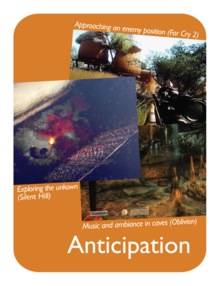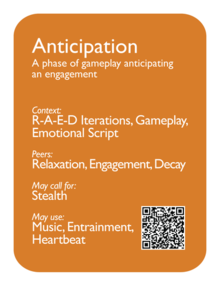Difference between revisions of "Anticipation"
ValterAlves (Talk | contribs) (The page for the sound design pattern/card named Anticipation) |
ValterAlves (Talk | contribs) m |
||
| Line 17: | Line 17: | ||
| rel4=[[Music]], [[Entrainment]], [[Heartbeat]]<br> | | rel4=[[Music]], [[Entrainment]], [[Heartbeat]]<br> | ||
| revisions =Introduced in version 1.0 | | revisions =Introduced in version 1.0 | ||
| + | | description = | ||
| + | [[Anticipation]] is one typical phase of the [[Emotional Script]] during [[Gameplay]]. It is used both alone and integrated in an iterated sequence ([[R-A-E-D Iterations]]) that can also involve some or all of the phases [[Relaxation]], [[Engagement]], and [[Decay]]. | ||
| + | |||
| + | Sound designers in the movie industry explore [[Anticipation]] in very effective ways. Yet, this is one of the aspects where techniques used in film practice are hardly 'importable' to game design. In games, contrary to what happens in movies, it is inherently difficult to predict what the player will do next, or even to assess the motivations behind the player's current behavior. Unless for instance interactivity is compromised by linearizing the gameplay in particular moments (to the possible extreme of inserting a [[Cut-Scenes | Cut-Scene]]), some artificial intelligence may be necessary to infer a proper moment for [[Anticipation]]. | ||
| + | |||
| + | Some [[Genre]] including survival horror make an extensive use of [[Anticipation]] for which it contributes the [[Ambiance]] and, for instance, the contrast between apparent [[Silence]] and aspects of the [[Character Soundprint]] which may trigger critical [[Engagement|Engagements]] (that is, [[Consequent Sound]]). | ||
| + | The proper nature of the genre, where [[Engagement]] is always imminent but seldom announced, makes it meaningful that sounds of [[Anticipation]] may be consistently presented even if it is not know if there will be actual [[Engament]] in the next moment. | ||
| + | |||
| + | | examples= | ||
| + | Papa Sangre takes profit of the fact that players are not in full control of their abilities to force risk behavior and to deal with the uncertainty of the respective consequence. | ||
| + | |||
| + | |||
}} | }} | ||
Revision as of 17:29, 13 August 2011

|

| |
| The card's front face | The card's back face |
Contents
Synopsis
| A phase of gameplay anticipating an engagement. |
Relationships
Context:
R-A-E-D Iterations ![]() , Gameplay File:M385px-Gameplay-front-v20.png, Emotional Script
, Gameplay File:M385px-Gameplay-front-v20.png, Emotional Script ![]() .
.
Peers:
Relaxation ![]() , Engagement
, Engagement ![]() , Decay
, Decay ![]() .
.
May call for:
stealth ![]() .
.
May use:
Music ![]() , Entrainment
, Entrainment ![]() , Heartbeat
, Heartbeat ![]() .
.
Description
Anticipation is one typical phase of the Emotional Script during Gameplay. It is used both alone and integrated in an iterated sequence (R-A-E-D Iterations) that can also involve some or all of the phases Relaxation, Engagement, and Decay.
Sound designers in the movie industry explore Anticipation in very effective ways. Yet, this is one of the aspects where techniques used in film practice are hardly 'importable' to game design. In games, contrary to what happens in movies, it is inherently difficult to predict what the player will do next, or even to assess the motivations behind the player's current behavior. Unless for instance interactivity is compromised by linearizing the gameplay in particular moments (to the possible extreme of inserting a Cut-Scene), some artificial intelligence may be necessary to infer a proper moment for Anticipation.
Some Genre including survival horror make an extensive use of Anticipation for which it contributes the Ambiance and, for instance, the contrast between apparent Silence and aspects of the Character Soundprint which may trigger critical Engagements (that is, Consequent Sound). The proper nature of the genre, where Engagement is always imminent but seldom announced, makes it meaningful that sounds of Anticipation may be consistently presented even if it is not know if there will be actual Engament in the next moment.
Examples
Papa Sangre takes profit of the fact that players are not in full control of their abilities to force risk behavior and to deal with the uncertainty of the respective consequence.